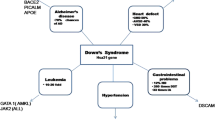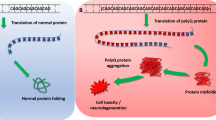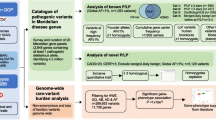Abstract
Startle disease, or hyperekplexia, is a glycinergic disorder characterized by hypertonia and apnea that is triggered by noise and/or touch. Mutations in five genes have been associated with startle disease in humans, dogs, cattle, and mice. We identified a novel recessive startle disease in a family of Spanish greyhounds. Whole genome resequencing of an affected dog revealed a homozygous two base pair deletion in the ninth exon of SLC6A5, encoding the presynaptic glycine transporter. The deletion is predicted to cause a frameshift, p.S460FfsX47, leading to a premature stop codon that truncates over a third of the protein. Family members were genotyped for the deletion, and findings were consistent with an autosomal recessive inheritance pattern. The pathogenic variant was absent from 34 unrelated greyhounds, 659 domestic dogs of pure and mixed breeds, and 54 wild canids, suggesting it occurred recently and may be private to the family. The findings of this study can be used to inform future breeding decisions and prevent dissemination of the deleterious allele in greyhounds.



Similar content being viewed by others
References
Bakker MJ, Van Dijk JG, van den Maagdenberg AM, Tijssen MA (2006) Startle syndromes. Lancet Neurol 5(6):513–524
Charlier C, Coppieters W, Rollin F, Desmecht D, Agerholm JS, Cambisano N, Carta E, Dardano S, Dive M, Fasquelle C, Frennet JC (2008) Highly effective SNP-based association mapping and management of recessive defects in livestock. Nat Genet 40(4):449
Eulenburg V, Becker K, Gomeza J, Schmitt B, Becker CM, Betz H (2006) Mutations within the human GLYT2 (SLC6A5) gene associated with hyperekplexia. Biochem Biophys Res Commun 348(2):400–405
Fox JG, Averill DR, Hallett M, Schunk K (1984) Familial reflex myoclonus in Labrador Retrievers. Am J Vet Res 45(11):2367–2370
Gill JL, Capper D, Vanbellinghen JF, Chung SK, Higgins RJ, Rees MI, Shelton GD, Harvey RJ (2011) Startle disease in Irish wolfhounds associated with a microdeletion in the glycine transporter GlyT2 gene. Neurobiol Dis 43(1):184–189
Gomeza J, Ohno K, Hülsmann S, Armsen W, Eulenburg V, Richter DW, Laube B, Betz H (2003) Deletion of the mouse glycine transporter 2 results in a hyperekplexia phenotype and postnatal lethality. Neuron 40(4):797–806
Gundlach AL, Kortz G, Burazin TC, Madigan J, Higgins RJ (1993) Deficit of inhibitory glycine receptors in spinal cord from Peruvian Pasos: evidence for an equine form of inherited myoclonus. Brain Res 628(1–2):263–270
Harvey K, Duguid IC, Alldred MJ, Beatty SE, Ward H, Keep NH, Lingenfelter SE, Pearce BR, Lundgren J, Owen MJ, Smart TG (2004) The GDP-GTP exchange factor collybistin: an essential determinant of neuronal gephyrin clustering. J Neurosci 24(25):5816–5826
Harvey RJ, Topf M, Harvey K, Rees MI (2008) The genetics of hyperekplexia: more than startle! Trends Genet 24(9):439–447
Li H, Durbin R (2009) Fast and accurate short read alignment with Burrows-Wheeler transform. Bioinformatics 25(14):1754–1760
López-Corcuera B, Arribas-González E, Aragón C (2018) Hyperekplexia-associated mutations in the neuronal glycine transporter 2. Neurochem Int 123:95–100
March PA, Knowles K, Thalhammer JG (1993) Reflex myoclonus in two Labrador Retriever littermates: a clinical, electrophysiological, and pathological study. Prog Vet Neurol 4:19–24
Plassais J, Kim J, Davis BW, Karyadi DM, Hogan AN, Harris AC, Decker B, Parker HG, Ostrander EA (2019) Whole genome sequencing of canids reveals genomic regions under selection and variants influencing morphology. Nat Commun (in press)
Rees MI, Lewis TM, Kwok JB, Mortier GR, Govaert P, Snell RG, Schofield PR, Owen MJ (2002) Hyperekplexia associated with compound heterozygote mutations in the β-subunit of the human inhibitory glycine receptor (GLRB). Hum Mol Genet 11(7):853–860
Rees MI, Harvey K, Ward H, White JH, Evans L, Duguid IC, Hsu CC, Coleman SL, Miller J, Baer K, Waldvogel HJ, Gibbon F, Smart TG, Owen MJ, Harvey RJ, Snell RG (2003) Isoform heterogeneity of the human gephyrin gene (GPHN), binding domains to the glycine receptor, and mutation analysis in hyperekplexia. J Biol Chem 278(27):24688–24696
Rees MI, Harvey K, Pearce BR, Chung SK, Duguid IC, Thomas P, Beatty S, Graham GE, Armstrong L, Shiang R, Abbott KJ (2006) Mutations in the gene encoding GlyT2 (SLC6A5) define a presynaptic component of human startle disease. Nat Genet 38(7):801
Shiang R, Ryan SG, Zhu YZ, Hahn AF, O’Connell P, Wasmuth JJ (1993) Mutations in the α1 subunit of the inhibitory glycine receptor cause the dominant neurologic disorder, hyperekplexia. Nat Genet 5(4):351–358
Thomas RH, Stephenson JB, Harvey RJ, Rees MI (2010) Hyperekplexia: stiffness, startle and syncope. J Pediatr Neurol 8(1):11
Thorvaldsdóttir H, Robinson JT, Mesirov JP (2013) Integrative genomics viewer (IGV): high-performance genomics data visualization and exploration. Brief Bioinform 14(2):178–192
Tijssen MAJ, Rees MI (2007) Hyperekplexia. 2007 Jul 31 [Updated 2012 Oct 4]. In: Adam MP, Ardinger HH, Pagon RA et al (eds) GeneReviews® [Internet], 1993–2018. University of Washington, Seattle
Vanhaesebrouck AE, Bhatti SF, Franklin RJ, Van Ham L (2013) Myokymia and neuromyotonia in veterinary medicine: a comparison with peripheral nerve hyperexcitability syndrome in humans. Vet J 197(2):153–162
Vite CH (2002) Myotonia and disorders of altered muscle cell membrane excitability. Vet Clin North Am Small Anim Pract 32(1):169–187
Acknowledgements
The authors would like to thank Hammon D. Humphries and Drs. Rooksana Noorai and Kate Tsai for technical assistance.
Funding
Sequencing studies were funded by the Comparative Neuromuscular Laboratory, University of California San Diego.
Author information
Authors and Affiliations
Corresponding authors
Ethics declarations
Conflict of interest
All authors declare no conflict of interest.
Ethical approval
All applicable international, national, and/or institutional guidelines for the care and use of animals were followed.
Additional information
Publisher’s Note
Springer Nature remains neutral with regard to jurisdictional claims in published maps and institutional affiliations.
Rights and permissions
About this article
Cite this article
Murphy, S.C., Recio, A., de la Fuente, C. et al. A glycine transporter SLC6A5 frameshift mutation causes startle disease in Spanish greyhounds. Hum Genet 138, 509–513 (2019). https://doi.org/10.1007/s00439-019-01986-x
Received:
Accepted:
Published:
Issue Date:
DOI: https://doi.org/10.1007/s00439-019-01986-x




